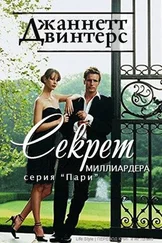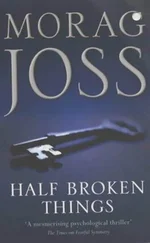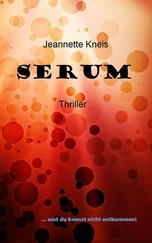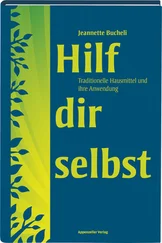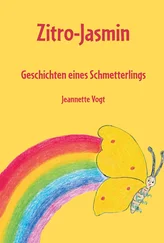Rosemary, Fidel, and his friends were waiting for us by the stream, letting their horses graze, and we all continued on together. The stream, fed by additional springs, gathered in strength and size the farther we went. Eventually, we reached a spot where the stream descended in a series of short falls, then we rode on for a ways before reaching the most breathtaking place I’d seen in my entire life. The creek poured through a gap in a cliff wall and cascaded a hundred feet down to a turquoise pool. The air was filled with mist from the thundering fall. The water’s vivid blue-green came from the lime that leached out of the underground springs. The mist in the air had the same lime in it and had covered everything near the fall-trees, bushes, rocks-with a white crystallized crust, creating one big natural sculpture garden.
It was midafternoon by the time we reached the Havasupai village, a collection of wattle huts where the stream flowed into the Colorado River. Around the huts, the stream fed into several pools of the same turquoise water. Naked Havasupai children were splashing in the water. We all dismounted, and Fidel and his friends dove into the biggest pond.
“Mom, can I go swimming, too?” Rosemary asked, so desperate to get in the water that she was hopping from foot to foot.
“You don’t have a swimsuit,” I said.
“I could swim in my underwear.”
“Certainly not,” Miss Pearl piped up. “It was improper enough for you to be riding behind that Indian boy.”
“And it would be unhygienic,” added Miss Finch. “There’s no telling what you’d find in that water.”
Fidel showed us to the guest hut. It was tight, but there was enough room for the four of us to stretch out on the mat on the dirt floor. Miss Pearl and Miss Finch were tired and wanted to rest, but Rosemary and I still had some gas left, and when Fidel offered to show us the valley, we took him up on it.
He found us all fresh horses, and we set out on a tour. Walls of red Coconino sandstone and pink Kaibab limestone rose steeply on both sides of the river. The narrow strip of bottomland was green and fertile, and we rode past rows of widely planted maize. Once upon a time, Fidel said, the Havasupai had spent the winter hunting game up on the plateau and come down to the valley to farm in the summer. But ever since they lost their traditional hunting grounds to the Anglo settlers, they’d remained holed up down here year-round, in the most remote spot in the entire west, a secret, hidden tribe living life the ancient way while most people on the outside world didn’t even know it existed. Fidel pointed out a pair of red rock pillars towering above the cliff wall. Those were the Wigleeva, he told us. They protected the tribe. It was said that any Havasupai who left for good would be turned to stone.
“This place is like heaven,” Rosemary said. “Even more than the ranch. I could live here forever.”
“Only Havasupai live here,” Fidel said.
“I’d become one,” she said.
“You can’t become a Havasupai,” I said. “You have to be born one.”
“Well,” Fidel said, “the elders do say Anglos can’t marry into the tribe, but as far as I know, none ever really tried to. So maybe you could be the first.”
As evening came on, the Havasupai offered us fried cornmeal cakes wrapped in leaves, but Miss Finch and Miss Pearl would have none of them, so we ate the biscuits and jerky I had packed.
The next day Miss Finch gave medical exams to the Havasupai children while Miss Pearl discussed their education with their parents, sometimes using Fidel as the interpreter. The village had a one-room school, but from time to time over the years, the state had decided that the Havasupai children weren’t getting a proper upbringing and had swooped in to round them up and send them to boarding school, whether their parents wanted it or not. There they learned English and were trained for jobs as porters, janitors, and telephone operators.
After a morning of interpreting for Miss Pearl, Fidel sat down next to me and Rosemary. “You people think you’re rescuing these children,” he said. “But they just end up unfit for both the valley and the world outside. Take it from me. I was sent to that school.”
“Well, at least when you left, you didn’t turn to stone,” Rosemary said.
“What turns to stone is inside you.”
In the afternoon Rosemary and I walked around the village. She continued to pester me about going swimming. I could tell that she could really see herself living here.
“Mom, it’s the Garden of Eden,” she kept saying. “The Garden of Eden still exists on this planet.”
“Don’t idealize this way of life,” I said. “I was born in a dirt house, and you get tired of it pretty quickly.”
In the evening, after another meal of biscuits and jerky, we turned in early again, but I was wakened in the middle of the night by a commotion. Rosemary, streaming wet, was standing outside the hut wrapped in a blanket. Miss Pearl had her by one arm and was shaking her, hollering about how she’d gotten up for some fresh air, heard laughter, and found Rosemary, Fidel, and a few other Indian kids swimming buck-naked in the moonlit pool.
“I wasn’t naked!” Rosemary shouted. “I was wearing underwear.”
“As if that makes a difference,” Miss Pearl said. “Those boys could see you.”
What I was hearing made me practically blind with rage. I couldn’t believe Rosemary would do this. I knew that Miss Pearl was appalled, not only at Rosemary but at me as well, wondering what kind of mother would raise such a shameless child. Miss Pearl might well decide it made me unfit to be a teacher. But I was also plain furious with Rosemary. I’d slept next to that girl every night to protect her. I thought I had taught her to be smarter than this, taught her that young men were dangerous, that seemingly innocent situations could result in trouble, that one misstep could lead to a disaster she might never recover from. Plus, I’d told her she couldn’t go swimming, and she’d outright disobeyed me.
I grabbed Rosemary by the hair, pulled her into the hut, and threw her onto the floor, then whipped off my belt and started hiding her. Something dark came out of me, so dark it scared me, but even so, I kept at that girl, who was scrambling around on the dirt floor whimpering, until I had the sickening feeling that I’d gone too far. Then I threw down the belt and stalked past Miss Pearl and Miss Finch out into the night.
THE NEXT DAY ITwas a long ride back up to the canyon rim. Fidel Hanna had made himself scarce, but one of the other Havasu boys came along to bring back the horses. Miss Pearl kept going on about how she was going to report Fidel Hanna to the sheriff for committing indecencies with a minor, but Rosemary and I stayed quiet. Whenever I glanced at Rosemary, she had her eyes on the ground.
Back at the ranch that night, I got into bed with Rosemary and tried to put my arm around her, but she pushed me away.
“I know you’re mad at me, but you needed that whipping,” I said. “There was no other way to teach you a lesson. Do you think you learned it?”
Rosemary was lying on her side staring at the wall. For a minute she was silent, then she said, “All I learned is that when I have children, I’m never going to whip them.”
That trip to the Garden of Eden turned out badly for just about everyone. After I told Jim about it, we agreed that hiring Fidel Hanna again was out of the question. That was a moot point, because when Fidel heard that Miss Pearl was threatening to turn him in to the sheriff, he joined the army.
He became a crack sharpshooter and was sent off to fight in the Pacific Islands, but war eventually unhinged Fidel and he was sent home suffering from shell shock. Not long after he returned, he came apart altogether and shot up a Hopi village. No one was killed, and when Fidel was freed from the state pen in Florence, he returned to the valley. But the Havasupai wouldn’t allow him into the village because he’d brought shame on the tribe, and he became an outcast, living by himself in a lonely corner of the reservation. He had, in the end, turned to stone.
Читать дальше

